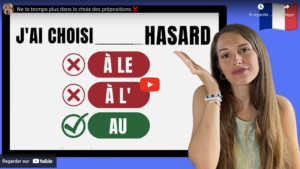Transcript
In French, we use the adverb "plutôt", "rather", in different cases.
Today we're going to look at what it can mean, how it can be used and above all, we're going to see some contextualizations to help you understand better and so that you too can use this adverb very easily.
Welcome to another French video. I hope you're in good shape and ready to make progress in French.
🚀 Transform your understanding of French IN 15 MINUTES A DAY
60 dialogues to boost your understanding of French 🇫🇷
Today, we're going to talk about the adverb rather. Before we start, please don't forget to "like" the video. You know it's very important to me. It's important to me that you support my channel and my work.
We'll look at two contexts where you can use this adverb. Let's start with the first. In French, we use "plutôt" to indicate a choice, a preference.
We use it to show our preference for something or someone, over another person or thing. You prefer this to that.
Rather will then create an opposition between two things or two people. It will introduce a preference, something we like better. Or we'll introduce something we'd recommend to someone else.
You'd rather do this than that. You're advised to prefer one thing over another.
Rather, it can be used at the beginning or middle of a sentence, depending on the context. Let's take a look at some contextualizations to help you understand.
Would you like strawberry or vanilla yoghurt? Vanilla, please.
You indicate through rather that you prefer vanilla yogurt.
Are you more of a pistachio ice cream or a chocolate ice cream? I'd rather have pistachio ice cream. Let's go to the sea this weekend instead of staying in Paris. Here you introduce something, an activity you would prefer to do this weekend.
You'd rather go to the seaside than stay in Paris.
Instead of watching TV all day, don't you want to go for a walk?
You see, here we've put "rather" in front of the thing we shouldn't actually do. Rather than, we could try replacing it with instead of.
Let's move on to the second use of the adverb "plutôt".
Rather can also be used just before an adjective to emphasize it. In this case, plutôt becomes a synonym for assez.
Enough in the sense, enough not in the sense stop. So it's enough in the sense of enough. This cake is pretty good. This cake is pretty good.
I'm pretty happy with my score on this French exam. That means you are quite happy, you are quite satisfied.
Thibault's pretty nice. Why don't you have a drink with him?
Again, the point here is that this person is quite nice.
That's it for today. I hope you've enjoyed this little video, and that you've understood a little better how to use the adverb "plutôt" in French.
If so, put a like, put a like and above all, subscribe to the channel and activate the bell so you don't miss any of my videos.
I'll see you soon.








